- About Us
- Programmes
- Publications
- Researchers
- Public Lectures
- Resource Centre
- Gallery
- Archives
- Directories & Documents
- Media Programme
- Winter Course on Forced Migration
- Research Activities
- Past Annual Reprots

|
|
 |
|
|
|||||||||
|
Passive Revolution in West Bengal:
1977-2011
A collection of articles by Samaddar from leading national dailies and journals between 1977 and the downfall of the Left in West Bengal, this book analyses the era of the Left rule, its political decisions viability. Samaddar argues that the Left’s rule and its own governmental style destroyed the hegemony it had built up through assiduous work of decades. A Commentary on contemporary history and an assessment of it, this work helps the reader understand better, the re-emergence of the Maoist movement in West Bengal, the governmental techniques of the Left and dynamics of popular politics. The evening of 13 May 2011: The setting sun was never so ‘red’ in West Bengal. From ‘red’ to ‘green’, a change in regime ushered in. But what happened in West Bengal on that day came in with a sense of déjà vu, a recall of Bengal 1977. The people wanted change then and the Left provided that. Something of that nature happened again in 2011.With the widespread misrule and violence marking the last phase of the Left Front rule, people massively voted for regime change. As the author says: ‘Passive democracy is democracy as practiced by the people in an epoch of passive revolution.’ This book narrates the story of the people, the society, the transition and thus traverses the whole course of passive revolution. This compilation is at once a history and a diary, a book and a journal- a kind of political journalism, engaged with questioning the truths of the day. For years to come, the story of this transition will remain an important lesson in popular politics and governance.
To procure the book, please contact Sage
which has published it / Authored by Ranabir Samaddar |
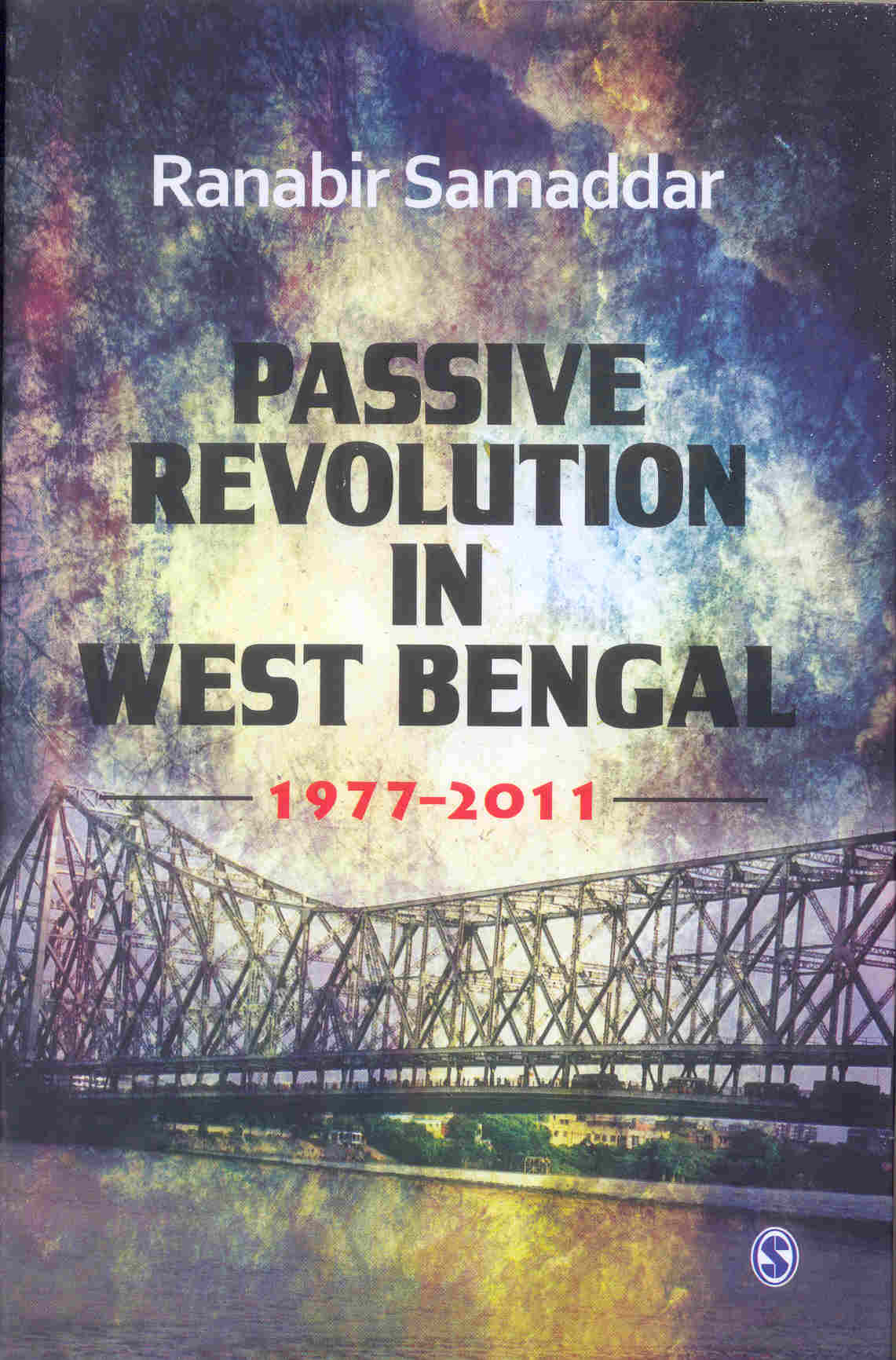 |
||||||||
|
|
|||||||||
|
Branding The Migrant: Arguments of Rights,
Welfare and Security
To procure the book, please contact frontpage which has published it
/ Edited by Atig Ghosh |
|
||||||||
|
|
|||||||||
|
Unstable Populations, Anxious States:
Mixed and Massive Population Flows in South Asia
The complexities of displacement have created massive,
mixed flows: refugees, asylum-seekers, illegal immigrants,
idps,
and other victims of violence, deprivation, hunger. Persecution and
discrimination occur together, and the old forms of protection are
often inadequate. The United Nations
High Commissioner for Refugees
(unhcr) responded with a
Ten-Point Plan of Action for Refugee Protection and Mixed Migration. This
was the focus of a two-day dialogue on 'Protection Strategies in
South Asia' organized by Mahanirban
Calcutta Research Group (mcrg),
which led to this comprehensive collection, compiled by social
scientists, media analysts and activists.
To procure the book, please contact Samya which has published it
/
Edited by
Paula
Banerjee |
|
||||||||
|
|
|||||||||
|
The Nation Form: Essays on Indian
Nationalism
It was and still remains a dispute about how to study the nation, and therefore the form of the nation. … There is no transcendental ideal of the nation, and to the extent that such an ideal is present, it only serves to hide the reality of the nation form. This book, thus, is not about nationalism, but about nation.
To procure the book, please contact Sage which has published it
/
Authored by Ranabir Samaddar |
|
||||||||
|
|
|||||||||
|
New Subjects and New Governance in India
|
|
||||||||
|
|
|||||||||
|
Political Transition and Development
Imperatives in India |
|
||||||||
|
|
|||||||||
|
Forced Migration in North East India: A
Media Reader The region though geographically isolated and economically underdeveloped, has a distinctive cultural; socio-economic and Political identity. Viewed from within, it represents an incredible diversity comprising over 200 indigenous communities. As the states in North East India have borders with several countries – China, Myanmar, Bhutan, Nepal and Bangladesh-since vivisection of the Indian subcontinent in 1947, the region has faced waves of population influx from across the borders at various times. Forced migration and displacement due to repeated ethnic violence have led to hundreds of villages being burnt and thousands of people killed. The figure of internality displaced persons in the region has surpassed the half a million mark according to a recent estimate. Besides ethnic conflicts, natural calamites such as floods and erosion, as well as construction activities or eviction in the reserve forest areas have added to the misery of the displaced persons in North East India, many of whom are languishing in the temporary camps for decades. However, the issue often does not get due coverage in the media and many journalists feel that the resources, tools and skills to cover this issue at their disposal are inadequate, The Media Reader is an effort to bridge this gap. To procure the book, please contact frontpage which has published it / Edited by Nilanjan Dutta |
|
||||||||
|
|
|||||||||
|
Women In Indian Borderlands The Chapters in the book examine the stories of women whose lives are interwined with borders, and who resist everyday violence in all its myriad forms. They show how most of the traditional efforts to make geopolitical regions mare secure end up privileging masculine definition of security that only results in feminine insecurities. These essays discuss hoe women negotiate their differences with a state that, though democratic, denies space to differences based on ethnicity, religion, class or gender. Borders are interpreted as ones where the jurisdiction of one state ends and that of the other begins. What comes out is the startling revelation that women not only live on the borders, but also , in many ways, form them. To procure the book, please contact Sage which has published it / Edited by Paula Banerjee and Anasua Basu Ray Chaudhury |
|
||||||||
|
|
|||||||||
|
Sustainability of Rights after
Globalisation The books talks about the interconnectedness of globalization with social and economic systems and how links develop with reference to both polity and common people’s movements. The book provides a new way of understanding the constitution of rights with the help micro-histories drawn from diverse fields, such as environmental rights, law, information, and labour studies in India. The book examines how rights have been redefined in this era of globalization and how India is still plagued by the constant tension between ‘social’ yearning for democratic values and ‘economic’ competition for unhindered profits.To procure the book, please contact Sage which has published it / Edited by Sabyasachi Basu Ray Chaudhury and Ishita Dey |
|
||||||||
|
|
|||||||||
|
Politics in
Hunger – Regime (Essays on the Right to Food in West Bengal) In this book , the researchers examine the population living under the shadow of hunger with particular emphasis on the evolution of Foods movements in West Bengal along with the development of Right to Food as a inside the court room and the ways it has shaped outside the courts through popular participation in political movements. While walking in-depth analyses of the hunger regime , the discourse throws light on the recent outrage in the Public Distribution System (Ration-Riots) in West Bengal, and critically examines the status in South Bengal , with particular emphasis on Paschim Medinipur , a District recording starvation deaths, seized the international media attention; the research simultaneously chronicles the true narratives of sufferings and struggle of the people in the Tea Garden region of the northern parts of West Bengal. In a Unique way, the book for the first time in India makes an attempt to link the Right to Food with the Right to Information in a Hunger-regime.To procure the book, please contact frontpage which has published it / Edited by Sibaji Pratim Basu and Geetisha Dasgupta |
|
||||||||
|
|
|||||||||
|
Counter-Gaze : Media, Migrants, Minorities The result is the present study that throws up some critical questions on how my migrants have come to form minority communities, how their claims to citizenship, rights and justice have occupied space in the politics of the nation and supra-national bodies. The collection of essays here highlight how the protection arrangements always fall short of their goal ,where protection becomes one more tool in the hands of the government to sustain the majority-minority divide and it refuses to accept the claims of minorities to equality and people-hood. A successful minority is one where the minority group withers away and the protection regime in turn becomes redundant. This research programme examined the European experience of the minority issues as well as the South Asian laws and practices. There is an increasing familiarity between the two sets of experiences and so the book is not so much about the counter gaze bu about the anticipated and resultant familiarity in human right’s struggles. To procure the book, please contact frontpage which has published it / Edited by Subir Bhaumik |
|
||||||||
|
|
|||||||||
|
Minorities in South Asia and Europe To procure the book, please contact Samya which has published it / Edited by Samir Kumar Das |
|
||||||||
|
|
|||||||||
|
Terror,
Terrorism, States & Societies :
A Historical and Philosophical Perspective This volume contains essays by international scholars, across different disciplines, and engages with several aspects of terror: as historical event; as a generalised discourse of ideology; as a feature in the continuum of violence; as ‘extreme violence’; and as the final marker of identity—ascribed, undertaken or imposed. The authors also discuss the historical and discursive relations between democracy and terror, liberalism and the rule of law, the ‘war on terror’ and the need for legitimacy; and a philosophical engagement with terror. Its scope ranges from the era of the Enlightenment and the French Revolution to the instruments of colonial terror, to post-colonialism and the global situation today, post-September 11, 2001. A compelling and sober consideration of one of modernity’s most intractable and complex issues. To procure the book, please contact Women Unlimited which has published it / Edited by Samir Kumar Das & Rada Iveković |
|
||||||||
|
|
|||||||||
CONTENTS |
|||||||||
|
|
|||||||||
|
Gandhi’s Dilemma in War and Independence To procure the book, please contact FrontPage Publication which has published it on behalf of CRG. / Authored by Ranabir Samaddar |
|
||||||||
|
|
|||||||||
|
Human Rights and Peace: Ideas,
Laws, Institutions and Movements
Through experiential articles on the themes of ideas, laws, institutions, and movements, this collection reveals how people's struggles against specific forms of institutionalised violence take the form of calls for 'peace'. It brings together hitherto unpublished writings on peace and human rights. It also includes some rare articles extracted from landmark published pieces. This book is an insightful resource for students and researchers of Peace Studies, Human Rights, Politics and International Relations. It is also an invaluable idea bank for activists, think tanks and policy makers who seek to understand the evolving paradigm of peace and human rights. To procure the book, please contact Sage Publication which has published it on behalf of CRG. / Edited by Ujjwal Kumar Singh |
|
||||||||
|
|
|||||||||
|
Fleeing
People of South Asia: Selections from Refugee Watch Essays have been divided, not chronologically, but on lines of broad based themes like ethical issues, laws, South Asia, India, gender, interview/correspondence and representations. Each section has been given a separate introduction, orienting the reader to the core-thought behind the classificatory scheme. Such categorization helps the reader in finding particular essays relevant to interests and makes the experience different from sifting through pages of the journal; thus justifying the conglomeration in the form of a book. It carries essays and articles by the CRG umbrella of scholars like Ranabir Samaddar, Paula Banerjee, Sabyasachi Basu Ray Chaudhury and Samir Kumar Das. Others include Meghna Guhathakurta, Jagat Acharya, Ammu Joseph, Tapan Kumar Bose, Flavia Agnes, Patrick Hoenig, Subir Bhaumik, Monirul Hussain, Anuradha Bhasin Jamwal, Kuntala Lahiri-Dutt and Rajesh Kharat to name a few. Particularly interesting is the section on interview/correspondence. There are letters from Palestinian Refugee Camp. There are several interviews with representative personnel like Ratan Gazmere from Bhutan, Dr Nawal El Saadawi from Aram Women’s Solidarity Association and Lev Grinberg from Israel. This section makes the book a winner because it straightaway passes over the microphone to the field people and makes their voice audible. To procure the book, please contact Anthem Press Publication which has published it on behalf of CRG. / Edited by Sibaji Pratim Basu |
|
||||||||
|
|
|||||||||
|
Women
in Peace Politics This volume, the
third in the series of the South Asia Peace Studies, deals with the myriad
dimensions of peace as practiced by South Asian women over a period of time.
It chronicles the live of “ordinary
“ women- their transformative role in peace and an attempt to create a
space of their own. Their peace activism is examined in the historical
context of their participation in national liberation movements since the
early 20th century. The articles in the collection adopt a new
approach to understanding peace- as a desire to end repression that cuts
across caste, class, race and gender and an effort on the part of women to
transform their position in society. This complication would interest a wide readership, beside s students and
scholars of human rights, peace and security studies, politics and
international relations. |
|
||||||||
|
|
|||||||||
|
Autonomy: Beyond Kant and Hermeneutics |
|
||||||||
|
|
|||||||||
|
The Materiality of Politics |
|
||||||||
|
|
|||||||||
|
The Politics of Autonomy: Indian Experiences
As this volume tells us, a critical inquiry into the idea of autonomy suggests that the politics of the future will be the politics of autonomies: an engagement that combines notions like self-government, women's autonomy, devolution of power, the rights of minorities, greater popular access to resources, and legal pluralism, and where different autonomies must learn to negotiate and co-exist. Viewing democratic theory through the lens of autonomy, the contributors:
In the process, the contributors traverse a wide range of issues relating to women's autonomy, peace accords, the nature of federalism in the Indian Constitution, autonomy in international law, and fiscal decentralization. These debates are then supported by case studies on the autonomy experiments in Kashmir, Darjeeling, and the entire Northeast, and on fiscal devolution.
Rich with empirical findings and combining research with dialogue, The Politics of Autonomy represents cutting-edge research on democracy. It will be widely welcomed by scholars of nationalism, democratic theory, federalism, law, women's rights, and multiculturalism.
To procure the book, please contact Sage Publications, which has published it on behalf of CRG. / Edited by Ranabir Samaddar |
|
||||||||
|
|
|||||||||
|
Peace Processes and Peace Accords The first volume in the South Asian Peace Studies (SAPS) series had advanced a general understanding of the nature of peace as a political problematic. This volume, the second, continues with the inquiry, looking at the political question of peace from three perspectives: the process of peace; the contentious issues involved in the peace process; and the ideologies that come in conflict in this process.
Arguing that peace is not a one-time event to be achieved and rejoiced over but a matter to be sustained against various odds, the contributors show that the sustainability of peace depends on a foundation of rights, justice, and democracy. Peace accords, they maintain, are only a moment in the process-the very act of signing an accord could mark either a continuation of the same conflict, or simply its metamorphosis. Therefore, as this volume shows, "negotiation" should be redefined as "joint problem-solving" on a long-term sustained basis, rather than "one-off hard bargaining."
While positing peace as a universal value, this book locates it in the specifics of both the internal and international contexts of South Asia, and provides a useful morphology of violence and conflicts. It also raises the question: How gender equitable is the peace we seek to achieve? Critiquing the dominant principles and protocols of peace accords and peace processes of the region, this volume also reinforces the importance of dialogue in the democratic theory of peace. It will attract the attention of students and scholars of political science, international relations, conflict resolution and defence studies, anthropology, and political philosophy. It will also be of interest to human rights lawyers, activists, and NGOs.
To procure the book, please contact Sage Publications, which has published it on behalf of CRG. / Edited by Samir Kumar Das |
|
|
|||||||
|
|
|||||||||
|
Indian
Autonomies
– Key Words and Key Texts
To procure the book, please contact SAMPARK, which has published it on behalf of CRG. / Edited by Sabyasachi Basu Roy Chowdhury, Samir Kumar Das and Ranabir Samaddar |
|
||||||||
|
|
|||||||||
|
Internal Displacement in South Asia This book deals with the situation of internally displaced people - those who have been forcibly displaced by natural disasters or development projects.
Each chapter is a case study authored by specialists from seven countries - India, Bangladesh, Nepal, Pakistan, Sri Lanka, Mayanmar and Afghanistan. The latter two countries have been included for their shared ethnic continuities with people of the neighbouring countries. The authors provide recommendations on how to minimize the insecurity of the displaced, as well as suggesting early warning systems as preventive measures to forestall displacement at the outset.
To procure the book, please contact Sage Publications, which has published it on behalf of CRG. / Edited by Paula Banerjee, Sabyasachi Basu Roy Chowdhury, Samir Kumar Das |
|
|
|||||||
|
|
|||||||||
|
South Asian Peace Studies 1 The first volume of the South Asian Peace Studies (2004) introduces the concept, scope and themes of peace studies. The second volume deals with peace accords in this region. The third volume narrates the experiences of women in conflict and peace. The fourth volume deals with human rights institutions in this region. The series is different from the usual conflict and conflict resolution studies, which revolve around interest-based approaches and game theories, and are based on the premise that “peace with justice” is an impossible agenda. The South Asian Peace Studies series has been planned as an exercise against that politics of excluding justice and democracy from conflict resolution and peace processes. The aim of the series is to bring into light practices of human rights, justice, dignity, reconciliation, and democracy, and lodge them at the heart of peace studies.
To procure the book, please contact Sage Publications, which has published it on behalf of CRG. / Edited by Ranabir Samaddar |
|
||||||||
|
|
|||||||||
|
Refugees and the State – Asylum and Protection Policy of India, 1947-2000 This is a collection of essays (2003) on the practices of asylum and refugee protection in India over the last fifty years. Written by specialists in the field of Political Science, History, Administration, Law and Gender Studies, this volume is a political, legal, institutional and ethical history concerning hospitality, care and protection. The book highlights the contradictions between these virtues and the manner in which state power organises care and protection of the vulnerable groups and communities, such as the asylum seekers. It is an extra-ordinary study on the interface between care and power.
To procure the book, please contact Sage Publications, which has published it on behalf of CRG. / Edited by Ranabir Samaddar |
|
||||||||
|
|
|||||||||
|
Refugees in West Bengal – Institutional Practices and Contested Identities This book (2000) is a significant addition to the existing discussion on how refugees are treated and managed worldwide under two different circumstances - with and without international support. This collection of essays by political scientists, sociologists, historians and human rights activists narrates the activities of the refugee protection institutions in West Bengal in the wake of the massive influx of refugees from East Pakistan after the Partition of 1947. The book highlights how the society of West Bengal absorbed this huge influx in the post-partition era in a quiet and effective manner despite a serious lack of necessary institutions of relief and care. At the same time, as the volume shows, the response and self-activism of the refugee community was a great factor in enabling the refugees to negotiate with an alien world and often a hostile political environment.
The result was not only some relief, rehabilitation, and re-settlement, but a contest of identities too. To procure this book, please contact CRG. / Edited by Pradip Kumar Bose |
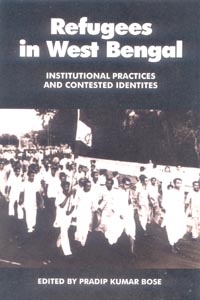 |
||||||||
|
|
|||||||||
|
Living on the Edge – Essays on the Chittagong Hill Tracts This collection of essays on the Chittagong Hill Tracts published (1997) immediately after the CHT Accord is based on three sets of writings - by human rights activists and researchers of Bangladesh who deal with several dimensions of the conflict as they impact on Bangladesh society, by Indian human rights activists and researchers who look into the impact on India including the refugee crisis, and the third, which is the heart of the volume, writings that carry the rebels' voices. Widely acclaimed as one of the most authoritative accounts on the CHT conflict and struggle, the volume is a product of CRG's long campaign for peace in the CHT, and collaboration between Bangladeshi and Indian peace activists.
For a copy of the volume please contact Manohar Publishers, Delhi. / Edited by Subir Bhaumik, Meghna Guhathakurta, and Sabyasachi Basu Ray Chaudhury |
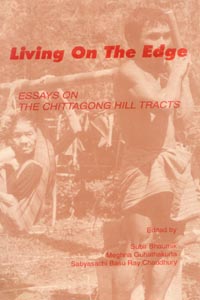 |
||||||||
|
|
|||||||||
|
Reflections on Partition in the East This is a collection of essays (1997) written by eminent historians, sociologists, and political scientists on the Partition of 1947 as it happened in the East. This volume takes a critical look at some of the existing accounts of the Partition in the east, and shows how the history that a partition creates becomes as significant for a political understanding of the event of partition as the history that produced partition in the first place. If an example of such history of partition is the continuing trans-border population movement across the borders, other instances are the continuing labour of memory, the emergence of new geo-political regions that make nation a problematic concept in South Asia.
For a copy of the book, please contact Vikas Publishers, who have published the volume on CRG's behalf. / Edited by Ranabir Samaddar |
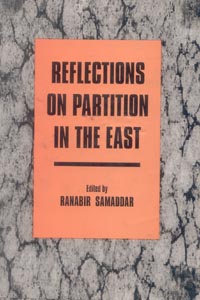 |
||||||||
|
|
|||||||||
|
Anyo Pakistan A pioneering work in Bengali on Pakistani writings, this is a Bengali collection (1996) of essays, poems and short stories that reflect the other voices in Pakistan. The contributors to this volume are engaged in struggles for peace and democracy in Pakistan. The original compilation was done by the Pakistan India People's Forum for Peace and Democracy.
For copies contact Punascha, Kolkata. / Edited by Ranabir Samaddar |
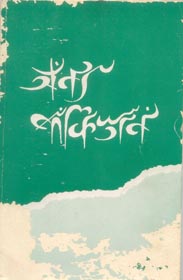 |
||||||||
|
|
|||||||||
|
Parbottyo Chattogram – Simanter Rajniti
This is a
chronicle (1995) in Bengali of the struggle for self-determination, autonomy
and peace by the indigenous people of the Chittagong Hill tracts (CHT),
Bangladesh. The monograph traces the origin of the CHT movement, and
examines the politics of demographic change and environment in a
strategically located region at the junction of South and Southeast Asia. |
 |
||||||||
|
|
|||||||||
| Abiram Raktopat - Tripuranarir Sangram |
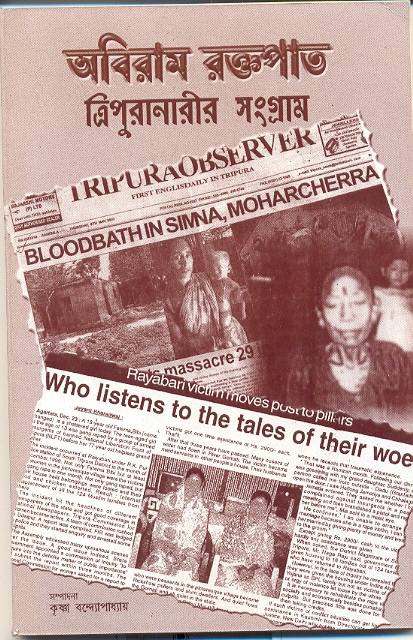 |
||||||||